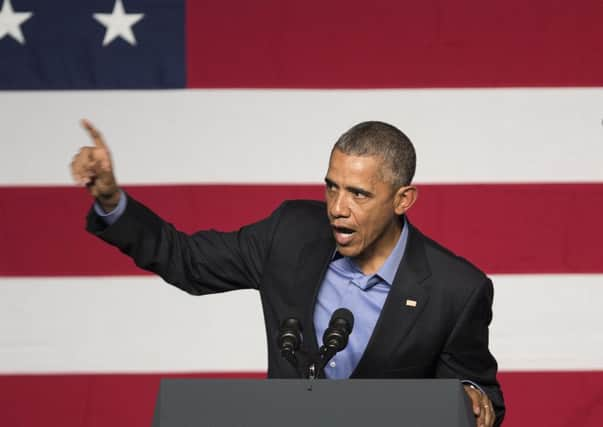David Owen: My letter to America on why Britain must quit EU


THERE has been a long tradition that US Presidential visits to this country do not take place close to General Election periods. The reasons for this are obvious and hitherto scrupulously observed by Washington DC. They also govern Prime Ministers visiting the United States.
In the autumn of 1978 as Foreign Secretary I mused about possibly inviting President Carter to repeat his very successful 1977 visit to Britain before October 1979. In the event we had an election in May. But I was wisely reminded that there had been some criticism of the only precedent of a visit close to a likely election when President Eisenhower met with Harold Macmillan on a visit to Britain in 1959.
Advertisement
Hide AdAdvertisement
Hide AdIt has been reported that President Obama will visit this country at the end of April in the midst of our referendum campaign to tell the British people to remain in the EU. Since postponement is unlikely I will address my remarks directly to President Obama before his arrival:
“Mr President, I respectfully request that if you come to the UK to tell us how to vote, that you consider the real questions before the British people and not just US concerns about a collapse in the euro. The damage for us remaining in the EU is much greater if there is a collapse even though we are not in the euro. For the UK the questions are
“Do we take in Britain this once-in-a-lifetime opportunity offered by our Prime Minister to get out of the dysfunctional EU in an agreed transitional period now? Or do we give up this opportunity and wait, risking a forced exit from the EU at a point of maximum disruption when the Eurozone suddenly collapses?
“As a firm supporter of your thoughtful Presidency and your determined policy on, above all, Iran supported by Britain, France and Russia as Permanent members of the UN, as well as Germany, I would ask before your visit that you examine the Eurozone’s dismal history as viewed from London, not Wall Street. After all for the first 150 years after your US 1788 Constitution called for monetary union, the US “was wracked by both regional disputes over monetary policies and institutions”. You were also one country with one language.
Advertisement
Hide AdAdvertisement
Hide Ad“Part of that examination, if you have not already done so, might be to read The End of Alchemy recently published by Mervyn King, the former Governor of the Bank of England. He writes: ‘The crisis of European Monetary Union will drag on, and it cannot be resolved without confronting either the supranational ambitions of the European Union or the democratic nature of sovereign national governments. One or other will have to give way....There is a limit to the economic pain that can be imposed in the pursuit of a federal Europe without a political counter-reaction.’
“We are seeing a political counter-reaction to the dysfunctional nature of the EU in various forms in every country in the EU and it is deeply troubling. Most vividly today we see it reflected in the German Lander election results primarily due to the inability of the EU to handle the migration crisis.
“In relation to the UK, Mr President, do not be misled by the ‘canard’ that the UK is going to break up if we vote to leave. The referendum on EU membership was announced by the Prime Minister in 2013, well before the Scottish referendum in 2014. Both referenda had been declared by all sides as a once–in-a-generation choice. No UK government will officially sanction another referendum for many years.
“It is not just the dysfunctional nature of the Eurozone that worries many of us in the UK. Many of us are lifetime Europeans and we are choosing to vote to leave so as to take the opportunity to counter balance the dysfunctional nature of the EU defence and foreign policies adopted since the creation of the Eurozone.
Advertisement
Hide AdAdvertisement
Hide Ad“Mr President, before you tell us how to vote, please recognise that some of us are determined, if and when outside the EU, to further expand our trade from EU markets, as we are doing already, but much faster to the rest of the world, achieve greater economic growth and improve our productivity. We intend to restore cuts in our worldwide presence and return to blue water diplomacy. With savings from the pretence of EU ‘common defence’ we intend to focus the UK’s defence effort on ‘hard’ defence within Nato. We are convinced we must learn from the mistakes our politicians and senior military figures made in the aftermath of the invasions of Iraq, Afghanistan and Libya.
“We will always be ready to go on working with France on difficult UN and Nato missions as well as other European Nato countries but the pretension around EU defence must be ended. It has been deeply damaging ever since it was envisaged by Prime Minister Blair and President Chirac.
“The choice to leave the EU is not an easy one for us in Britain but it is being taken not only on the balance of advantage for the UK but also for the wider Europe, and our partners Canada and the US in Nato.”
David Owen is a former foreign secretary and author of The UK’s In-Out Referendum: EU Foreign and Defence Policy Reform which was launched by the Centre for Policy Studies this week.